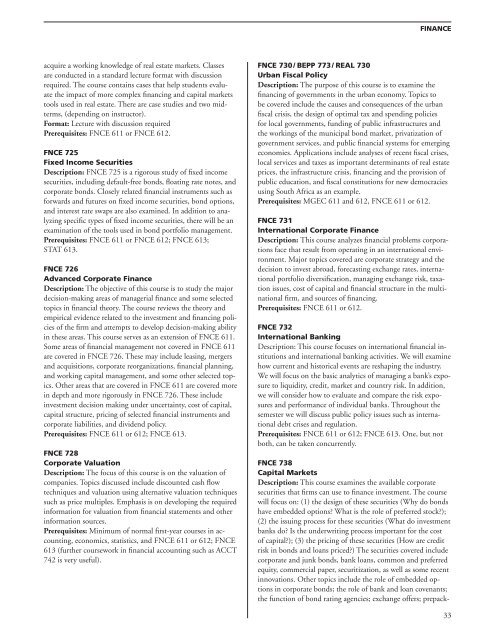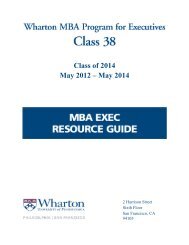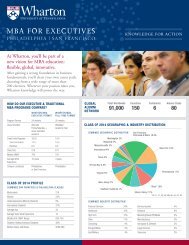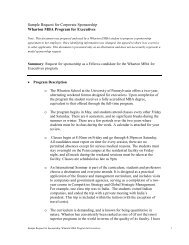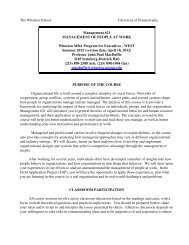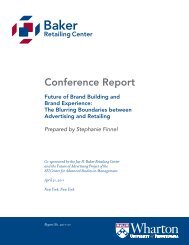Explore Options; Plan Your MBA Academic Program
Explore Options; Plan Your MBA Academic Program
Explore Options; Plan Your MBA Academic Program
Create successful ePaper yourself
Turn your PDF publications into a flip-book with our unique Google optimized e-Paper software.
acquire a working knowledge of real estate markets . Classes<br />
are conducted in a standard lecture format with discussion<br />
required . The course contains cases that help students evaluate<br />
the impact of more complex financing and capital markets<br />
tools used in real estate . There are case studies and two midterms,<br />
(depending on instructor) .<br />
Format: Lecture with discussion required<br />
Prerequisites: FNCE 611 or FNCE 612 .<br />
FNCE 725<br />
Fixed Income Securities<br />
Description: FNCE 725 is a rigorous study of fixed income<br />
securities, including default-free bonds, floating rate notes, and<br />
corporate bonds . Closely related financial instruments such as<br />
forwards and futures on fixed income securities, bond options,<br />
and interest rate swaps are also examined . In addition to analyzing<br />
specific types of fixed income securities, there will be an<br />
examination of the tools used in bond portfolio management .<br />
Prerequisites: FNCE 611 or FNCE 612; FNCE 613;<br />
STAT 613 .<br />
FNCE 726<br />
Advanced Corporate Finance<br />
Description: The objective of this course is to study the major<br />
decision-making areas of managerial finance and some selected<br />
topics in financial theory . The course reviews the theory and<br />
empirical evidence related to the investment and financing policies<br />
of the firm and attempts to develop decision-making ability<br />
in these areas . This course serves as an extension of FNCE 611 .<br />
Some areas of financial management not covered in FNCE 611<br />
are covered in FNCE 726 . These may include leasing, mergers<br />
and acquisitions, corporate reorganizations, financial planning,<br />
and working capital management, and some other selected topics<br />
. Other areas that are covered in FNCE 611 are covered more<br />
in depth and more rigorously in FNCE 726 . These include<br />
investment decision making under uncertainty, cost of capital,<br />
capital structure, pricing of selected financial instruments and<br />
corporate liabilities, and dividend policy .<br />
Prerequisites: FNCE 611 or 612; FNCE 613 .<br />
FNCE 728<br />
Corporate valuation<br />
Description: The focus of this course is on the valuation of<br />
companies . Topics discussed include discounted cash flow<br />
techniques and valuation using alternative valuation techniques<br />
such as price multiples . Emphasis is on developing the required<br />
information for valuation from financial statements and other<br />
information sources .<br />
Prerequisites: Minimum of normal first-year courses in accounting,<br />
economics, statistics, and FNCE 611 or 612; FNCE<br />
613 (further coursework in financial accounting such as ACCT<br />
742 is very useful) .<br />
FINANCE<br />
FNCE 730 / BEPP 773 / REAL 730<br />
Urban Fiscal Policy<br />
Description: The purpose of this course is to examine the<br />
financing of governments in the urban economy . Topics to<br />
be covered include the causes and consequences of the urban<br />
fiscal crisis, the design of optimal tax and spending policies<br />
for local governments, funding of public infrastructures and<br />
the workings of the municipal bond market, privatization of<br />
government services, and public financial systems for emerging<br />
economies . Applications include analyses of recent fiscal crises,<br />
local services and taxes as important determinants of real estate<br />
prices, the infrastructure crisis, financing and the provision of<br />
public education, and fiscal constitutions for new democracies<br />
using South Africa as an example .<br />
Prerequisites: MGEC 611 and 612, FNCE 611 or 612 .<br />
FNCE 731<br />
International Corporate Finance<br />
Description: This course analyzes financial problems corporations<br />
face that result from operating in an international environment<br />
. Major topics covered are corporate strategy and the<br />
decision to invest abroad, forecasting exchange rates, international<br />
portfolio diversification, managing exchange risk, taxation<br />
issues, cost of capital and financial structure in the multinational<br />
firm, and sources of financing .<br />
Prerequisites: FNCE 611 or 612 .<br />
FNCE 732<br />
International Banking<br />
Description: This course focuses on international financial institutions<br />
and international banking activities . We will examine<br />
how current and historical events are reshaping the industry .<br />
We will focus on the basic analytics of managing a bank’s exposure<br />
to liquidity, credit, market and country risk . In addition,<br />
we will consider how to evaluate and compare the risk exposures<br />
and performance of individual banks . Throughout the<br />
semester we will discuss public policy issues such as international<br />
debt crises and regulation .<br />
Prerequisites: FNCE 611 or 612; FNCE 613 . One, but not<br />
both, can be taken concurrently .<br />
FNCE 738<br />
Capital Markets<br />
Description: This course examines the available corporate<br />
securities that firms can use to finance investment . The course<br />
will focus on: (1) the design of these securities (Why do bonds<br />
have embedded options? What is the role of preferred stock?);<br />
(2) the issuing process for these securities (What do investment<br />
banks do? Is the underwriting process important for the cost<br />
of capital?); (3) the pricing of these securities (How are credit<br />
risk in bonds and loans priced?) The securities covered include<br />
corporate and junk bonds, bank loans, common and preferred<br />
equity, commercial paper, securitization, as well as some recent<br />
innovations . Other topics include the role of embedded options<br />
in corporate bonds; the role of bank and loan covenants;<br />
the function of bond rating agencies; exchange offers; prepack-<br />
33


